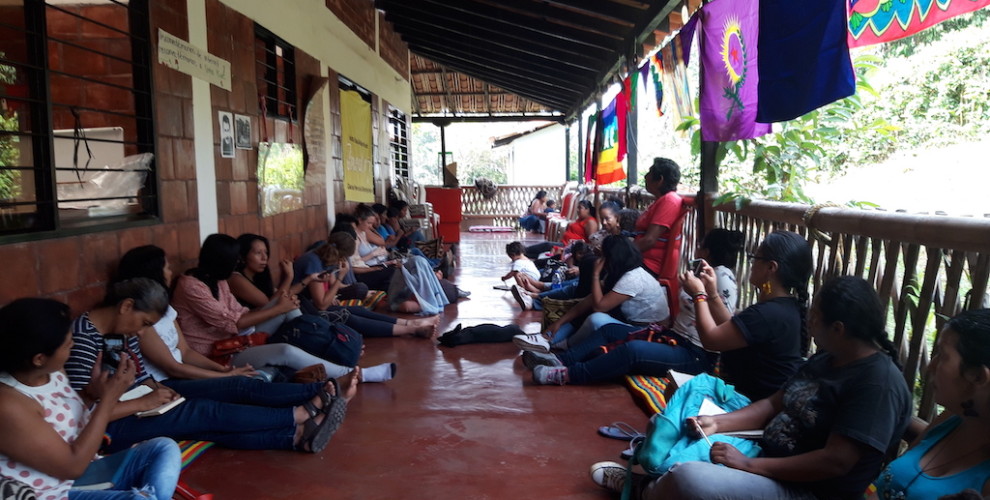Jineology in Colombia: weaving threads of common struggle
Jineology has been traveling around Colombia, weaving threads of common struggle.
Jineology has been traveling around Colombia, weaving threads of common struggle.

The month of February has been a busy one for Jineology. Representatives of the Kurdish women’s movement have been traveling around Colombia, from Bogota to Medellin, from Cali to Armenia.
After the meetings in Medellin and Cali, Jineology reached Armenia, in the region of Quindío where a seminar was held in one of the many cultural centres where women from different groups came together in this region, inhabited over ten thousand years ago by the civilisation of the Quimbayas, that left deep traces also through oral history, legends and myths as well as of the resistance of federated peoples fighting against Spanish conquest.
The need to show in the context of a democratic modernity the inextricable link with the living history of women from the past till today and for new futures have underlined the urgency to form, in Armenia too, women’s committees that could work and reconnect with their struggle memory through the tools offered by Jineology.
After a debate that put in the middle the analysis of the war patriarchal methods brought about by the different States at global level, Zilan Diyar has shown how Jineology could provide a starting point to deepen the knowledge of every specific struggle contexts while creating at the same time new alliances: Jineology offers, through the analysis of mythology, philosophy and social science disconnected from power, tools for the organization and deep transversal struggle practices united by a vision of strategic solidarity.
A video of solidarity with the radical action promoted by HDP Hakkari MP Leyla Guven to break isolation imposed on Ocalan, as symbol of the international women struggle against all fascisms, has been shown in the city of Armenia for Kurdistan. A video in support to the struggle of human rights defenders and the hunger strikers who are fasting for over 100 days.
The need to create new scientific paradigms based on the knowledge of the struggle carried out by women, leaving aside positivist approaches for a holistic and confederal vision of the world, has been the core issue debated at the university of Quindio. Promoted by the Social Work Investigation Group on nonviolence, peace and human development, the conference has offered the possibility to put into context the Kurdistan women movement and the women social science promoted by women in Kurdistan.
National television channels have broadcast in-depth analysis about the current context in Latin America and have given room to the urgency to create, against coup temptation and the repetition of the status quo, the possibility of a third way, following the living and successful example of the co-existence and self-government carried out by the peoples of the Democratic Federation of Northern Syria.
In the crowded session, the questions and speeches have offered the possibility to discuss issues important both for Latin America and Kurdistan: how is it possible, starting from Ocalan’s philosophical thought and based on the democratic confederalism and Jineology, against sexism and racism, to build a democratic and ecological society based on women’s liberation as a first step towards the liberation of the entire society?
The conference closed with a video in memory of Argentinian fighter, doctor and revolutionary Legerin Ciya (Alina Sanchez), to mark the first anniversary of her death.
The struggle and territory defence committees at the conference, together with groups of people’s educators, environmental organisation, political organisations and social and civil centres, human rights defenders’ committees, women and peace groups have all posed the question of how to decline practices of sisterhood against patriarchal mentality outside the centralisation of a single experience and within a pluralist dynamic based on democratic autonomy.
Moving to another plan, away from homologation ideas based on a patronising and abstract universalism, the tour of Jineology in Colombia has proposed the basis, to link through different methods, to the revolutionary struggle alive in the women of Latin America and the world.
When asked “What brought you to Colombia?” Zilan Diyar from the Jineologij committee answered: “The awareness of being so closed to you, and the fact to feel as mine and as a contribution to the world, the expression of strength and freedom of women who organise to defeat the patriarch mentality.”
The journey of Jineology ends with the sisters and comrades of the region of Cauca, known for its resistance and practices of self-government, as well as for the historic revolts that led to the opening of new imagination spaces and struggle processes, from the resistance of the ‘70s to the indigenous mobilisation of 2000, to the struggle for the liberation of the Mother Earth (Uma Kiwe, in Nasa language).
Jineology found echo in Colombia learning from the challenges posed by the ancestral knowledges of women to revolutionary movements, favouring a living future, born from a past and present to think together in practice. Putting together differences and common goals, showing how freedom in the collective strength of women self-organisation is able today, with creative methods, to strongly resound expanding more than ever and opening a new historic phase.